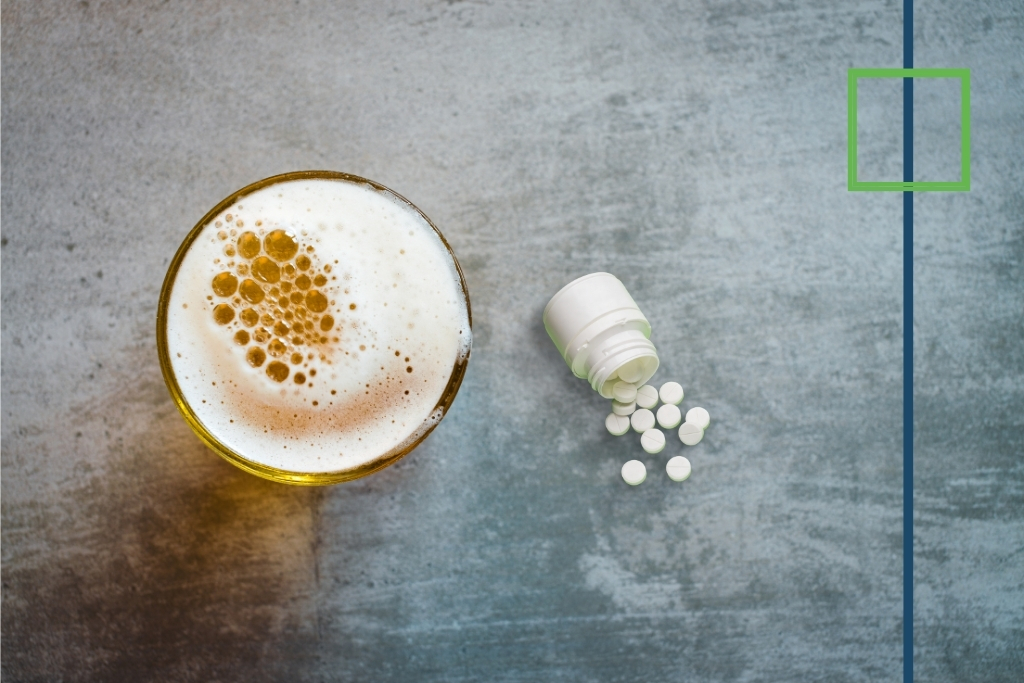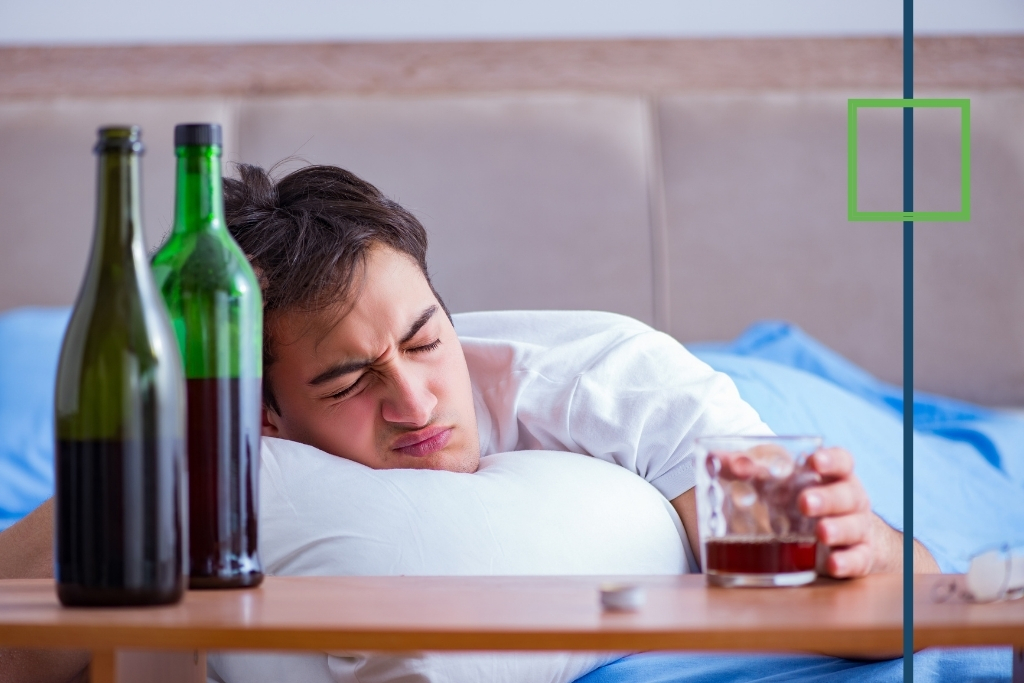What is Alcohol?
Alcohol is a drug that can be toxic and addictive. Yes, alcohol is a depressant drug. Drinking a small amount of alcohol can make you feel more relaxed or happy, but alcohol is a depressant. Alcohol is a psychoactive substance that is classified as a central nervous system (CNS) depressant. This means that excessive consumption inhibits activity in the CNS (brain and spinal cord), eventually resulting in slurred speech, impaired coordination, and delayed reaction time.
Although classified as a depressant, the amount of alcohol consumed determines the type of effect. Most people drink alcohol for the stimulant effect, such as a beer or glass of wine taken to “loosen up.” But if a person consumes more than the body can handle, they then experience alcohol’s depressant effect. They start to lose coordination and control. Alcohol overdose causes even more severe depressant effects (inability to feel pain, alcohol intoxication where the body vomits the poison, and finally unconsciousness or, worse, coma or death from severe toxic overdose). These reactions depend on how much is consumed and how quickly.

Alcohol is among the most used drugs, plays a large role in many societies and cultures around the world, and greatly impacts public health. According to the National Institute on Alcohol Abuse and Alcoholism (NIAAA) [1], a standard alcoholic drink in the United States contains 14.0 grams (0.6 ounces) of pure alcohol. Generally, this amount of pure alcohol is found in
- 12 ounces of beer
- 8–9 ounces of malt liquor
- 5 ounces of wine
- 1.5 ounces, or a “shot,” of 80-proof distilled spirits (liquor)
According to the Center for Disease Control and Prevention (CDC) [2], drinking too much can harm your health. Excessive alcohol use led to approximately 95,000 deaths and 2.8 million years of potential life lost (YPLL) each year in the United States, shortening the lives of those who died by an average of 29 years. Further, excessive drinking was responsible for 1 in 10 deaths among working-age adults aged 20-64 years.

Get Your Life Back
Find Hope & Recovery. Get Safe Comfortable Detox, Addiction Rehab & Mental Health Dual Diagnosis High-Quality Care at the We Level Up Treatment Centers Network.
Hotline (877) 378-4154What is a Drug?
Drugs are a broader category. According to the National Institute of Health (NIH)[3], drugs are chemical substances that can change how your body and mind work. They include prescription medicines, over-the-counter medicines, alcohol, tobacco, and illegal drugs. Drug misuse is dangerous. It can harm your brain and body, sometimes permanently. It can hurt the people around you, including friends, families, kids, and unborn babies. Repeated drug use can also lead to addiction. Drug addiction is a chronic brain disease. It causes a person to take drugs repeatedly, despite the harm they cause.
Alcohol is the most socially acceptable drug on the market and the most easily accessible. Even with this knowledge, the general public still has a tendency to believe alcohol is ok, not dangerous, and an acceptable form of relaxation. Science tells us something different. Alcohol is the deadliest drug of all. Alcohol is the third leading preventable cause of death in the US The National Institute on Alcohol Abuse and Alcoholism (NIAAA) [4] has reported that alcohol causes 88,000 deaths each year. Alcohol is different than other illicit substances that we know can cause overdose deaths because alcohol can also kill people slowly by deteriorating the body.
Mixing Alcohol with Other Drugs
Mixing Alcohol with other drugs, prescription, and non-prescription, can have complicated, and at times dangerous interactions. The danger is real. Mixing alcohol with certain medications can cause nausea and vomiting, headaches, drowsiness, fainting, or loss of coordination. It also can put you at risk for internal bleeding, heart problems, and difficulties in breathing. In addition to these dangers, alcohol can make a medication less effective or even useless, or it may make the medication harmful or toxic to your body.
When an interaction happens, it changes the way that you process the two substances. It also changes the effects of the two. Basically, many alcohol-drug interactions can be harmful and toxic to your body. To understand the real risks, you need to understand what happens.
Basically, there are two main types of interactions possible:
- A pharmacokinetic interaction, when alcohol interacts with the metabolism, absorption, and excretion of the other substance.
- A pharmacodynamic interaction, when alcohol intensifies the effects of the substance.
Alcohol and Allergy Medicine
If you’ve mixed alcohol and allergy medicine you should rest and wait for the effects to subside. Never mix alcohol and antihistamines like Benadryl before driving, because driving requires mental alertness. The risk of falling unconscious is one of the main reasons why mixing Benadryl and alcohol often leads to personal injury. Unfortunately, that isn’t the only health risk that someone can experience. Drinking alcohol and taking Benadryl makes it harder to control body movement well for people of all ages. But it may be even riskier for seniors.
Get Help. Get Better. Get Your Life Back.
Searching for Accredited Drug & Alcohol Rehab Centers Near You? Or Mental Health Support?
Even if you have failed previously, relapsed, or are in a difficult crisis, we stand ready to support you. Our trusted behavioral health specialists will not give up on you. Call us when you feel ready or want someone to speak to about therapy alternatives to change your life. Even if we cannot assist you, we will lead you wherever you can get support. There is no obligation. Call our hotline today.
FREE Addiction Hotline – Call 24/7Alcohol and Antibiotics
Combining antibiotics and alcohol will not usually lower your antibiotic’s effectiveness, but it may cause side effects and hinder your body’s natural ability to heal itself. Drinking alcohol while you’re fighting an infection can lead to upset stomach dehydration, lower your immune response and interrupt normal sleep. Some antibiotics can also be dangerous for your liver, so it’s important to check with your doctor or pharmacist before mixing antibiotics and alcohol.
Alcohol and Amphetamines
Amphetamines increase your heart rate, breathing, and blood pressure. Taking alcohol and amphetamines together puts pressure on your heart and could cause death. Amphetamines can also raise your body temperature and cause dehydration, which is worse if you also drink alcohol. As amphetamines can give you a false sense of sobriety, you might drink more to become intoxicated. You can also feel that you have more energy and confidence but, mixed with alcohol, you can become aggressive and paranoid.

Alcohol and Cocaine
Alcohol and cocaine in the bloodstream form a toxic substance known as ‘cocaethylene’. It is more toxic than either drug alone. Cocaethylene is linked to liver damage and can cause fatal heart problems. Mixing alcohol and cocaine can give you a false sense of sobriety, so you might drink more to become intoxicated. By taking both drugs together, you’re likely to be aggressive and behave violently.
Alcohol and Ecstasy (MDMA)
Alcohol and ecstasy (MDMA) both dehydrate your body. By taking both together, you risk overheating and becoming very dehydrated. The combination of alcohol and ecstasy puts pressure on your liver and kidneys. This could cause these organs to stop working.
Alcohol and Heroin
Heroin slows down your heart rate and breathing. Your risk of overdose increases when you take alcohol with heroin. You might choke if you vomit, as both drugs together impair your gag reflex.
Alcohol and Adderall
Not only is mixing Adderall and alcohol bad, but it’s also deadly. Whether an Adderall overdose happens accidentally or on purpose, it can lead to death. Yes, mixing Adderall and alcohol can kill you. Although this may seem disturbing, the risk of overdose is increased when several drugs or substances are taken at a time. In addition, as previously mentioned, because Adderall and alcohol belong to different drug classes, they can collide to produce unpredictable and dangerous side effects.
Alcohol and Zoloft
While it’s recognized that alcohol can interfere with your overall alertness and your ability to make decisions, mixing Zoloft and alcohol can add to this effect. Your ability to drive a vehicle, motor skills, and judgment will be impaired far more when combining Zoloft and alcohol than if you were to drink alcohol alone. While it’s recognized that alcohol can interfere with your overall alertness and your ability to make decisions, mixing Zoloft and alcohol can add to this effect. Your ability to drive a vehicle, motor skills, and judgment will be impaired far more when combining Zoloft and alcohol than if you were to drink alcohol alone.
Alcohol and Bactrim
Consuming Bactrim and alcohol does not usually result in death. However, you should remember that drinking alcohol excessively makes a person’s immune system weaken. It can be addictive and can cause death. In addition, there are side effects associated with combining Bactrim and alcohol.
Alcohol and Valium
Because Valium works on the central nervous system (CNS) to calm overactive electrical impulses in the brain, it reacts poorly with depressants like alcohol, which can also suppress nervous system activity. When combined, alcohol can amplify the effects of Valium. While that may mean a better buzz or a mild high, it can also mean more extreme tranquilizing effects. Valium and alcohol are both depressants (sedatives), therefore combining the two enhances the sedative effect and can lead to abuse, loss of consciousness, and brain damage.
Is Alcohol Classified as a Drug?
Alcohol is a drug. It is classified as a Central Nervous System (CNS) depressant, which means that drinking alcohol slows down brain functioning, neural activity, and further reduces the functioning of various vital functions in the body. This is due to the increased production of the inhibitory neurotransmitter, gamma-aminobutyric acid, or GABA.
The U.S. Drug Enforcement Administration (DEA) has drug schedules where drugs, substances, and other chemicals used to make drugs are classified into five distinct categories, or schedules, depending on the drug’s medical use and the drug’s potential for abuse. You’ve probably noticed that alcohol is not on the DEA’s controlled substance list. Due to this, alcohol brands are free to advertise as they please on television, social media, and everywhere else we look. It’s easy to get people hooked, and it makes brands money in the process.
First-class Facilities & Amenities
World-class High-Quality Addiction & Mental Health Rehabilitation Treatment
Rehab Centers TourRenowned Addiction Centers. Serene Private Facilities. Inpatient rehab programs vary.
Addiction Helpline (877) 378-4154Proven recovery success experience, backed by a Team w/ History of:
15+
Years of Unified Experience
100s
5-Star Reviews Across Our Centers
10K
Recovery Success Stories Across Our Network
- Low Patient to Therapist Ratio
- Onsite Medical Detox Center
- Comprehensive Dual-Diagnosis Treatment
- Complimentary Family & Alumni Programs
- Coaching, Recovery & Personal Development Events
How Does Alcohol Work?
When someone consumes large quantities of alcohol, specifically more than the body is equipped to process, the result is depressant effects. Some of the many depressant effects from alcohol include:
- Delayed reaction time
- Cognitive impairments
- Slurred speech
- Unsteady gait
- Poor coordination or lack of motor skills
- Distorted perceptions
- Lessened inhibitions
- Distorted judgment
- Sedation
Although alcohol is clinically classified as a depressant, it also is proven to have stimulant effects depending on the amount and rate at which the alcohol is consumed. In small quantities, alcohol is more likely to result in stimulatory effects. These stimulatory effects are often the effects many people seek when they drink alcohol. Some of the stimulatory effects of alcohol include:
- Talkativeness
- Over-confidence
- Improvements in mood
- Increased blood pressure
- Increased heart rate
- Euphoria
When a person consumes larger quantities of alcohol, specifically more than the body is equipped to process, the drinker is more likely to experience the depressant effects of alcohol. Whether drinking beer, wine, or liquor, the amount used can drastically impact whether the user experiences depressant or stimulant effects.
There is a higher risk of developing an alcohol use disorder, also referred to as alcoholism, in people who experience a greater stimulant response after consuming alcohol. Those who do not have a risk for alcohol dependence are more likely to experience a greater sedative response. There are other genetic, environmental, and familial factors that influence whether an individual will develop an alcohol use disorder, however, all of these factors may play a role in the development of alcoholism.
The Effects of Alcohol
Drinking too much – on a single occasion or over time – can take a serious toll on your health. Here’s how alcohol can affect your body:
Brain: Alcohol interferes with the brain’s communication pathways, and can affect the way the brain looks and works. These disruptions can change mood and behavior, and make it harder to think clearly and move with coordination.
Heart: Drinking a lot over a long time or too much on a single occasion can damage the heart, causing problems including:
- Stroke
- High blood pressure
- Stroke
- High blood pressure
Liver: Heavy drinking takes a toll on the liver, and can lead to a variety of problems and liver inflammations including:
- Steatosis, or fatty liver
- Alcoholic hepatitis
- Fibrosis
- Cirrhosis

Pancreas: Alcohol causes the pancreas to produce toxic substances that can eventually lead to pancreatitis, a dangerous inflammation and swelling of the blood vessels in the pancreas that prevents proper digestion.
Cancer: According to the National Cancer Institute: “There is a strong scientific consensus that alcohol drinking can cause several types of cancer. In its Report on Carcinogens, the National Toxicology Program of the US Department of Health and Human Services lists consumption of alcoholic beverages as a known human carcinogen.
Immune System: Drinking too much can weaken your immune system, making your body a much easier target for disease. Chronic drinkers are more liable to contract diseases like pneumonia and tuberculosis than people who do not drink too much.
Short-term Side Effects of Alcohol
Excessive alcohol use has immediate effects that increase the risk of many harmful health conditions. These are most often the result of binge drinking and include the following:
- Injuries, such as motor vehicle crashes, falls, drownings, and burns.
- Violence, including homicide, suicide, sexual assault, and intimate partner violence.
- Alcohol poisoning, a medical emergency that results from high blood alcohol levels.
- Risky sexual behaviors, including unprotected sex or sex with multiple partners. These behaviors can result in unintended pregnancy or sexually transmitted diseases, including HIV
- Miscarriage and stillbirth or fetal alcohol spectrum disorders (FASDs) among pregnant women.
Long-Term Health Risks
Over time, excessive alcohol use can lead to the development of chronic diseases and other serious problems including:
- High blood pressure, heart disease, stroke, liver disease, and digestive problems.
- Cancer of the breast, mouth, throat, esophagus, voice box, liver, colon, and rectum.
- Weakening of the immune system, increasing the chances of getting sick.
- Learning and memory problems, including dementia and poor school performance.
- Mental health problems, including depression and anxiety.
- Social problems, including family problems, job-related problems, and unemployment.
- Alcohol use disorders, or alcohol dependence.
Why is Alcohol Addictive?
Alcohol addiction is a chronic disease characterized by the uncontrollable seeking of alcohol, as well as drinking that is compulsive, or difficult to control, despite harmful personal or professional consequences. Alcohol is both physically and psychologically addictive. In regard to the physically addictive aspect, drinking alcohol stimulates the release of endorphins and dopamine, both of which produce euphoric sensations, such as feelings of pleasure.
Many individuals who consume alcohol are not aware that alcohol can actually cause physical changes in the brain’s chemistry and functioning, which also plays a major role in the development of alcohol dependence. The brain’s reward and pleasure centers become overloaded when an individual consumes alcohol regularly, resulting in cravings to repeat their drinking habits and behaviors.
Alcohol is psychologically addictive because it becomes a learned behavior that affects one’s thoughts and beliefs. Alcohol is also commonly used as a coping mechanism for stress, anxiety, or other discomforting emotions and feelings. This coping mechanism can become a habit that may seem impossible to break. Fortunately, there are many alcohol treatment centers available that offer psychotherapy to help individuals find the motivation and hope to begin their recovery process.
World-class, Accredited, 5-Star Reviewed, Effective Addiction & Mental Health Programs. Complete Behavioral Health Inpatient Rehab, Detox plus Co-occuring Disorders Therapy.
CALL (877) 378-4154End the Addiction Pain. End the Emotional Rollercoaster. Get Your Life Back. Start Drug, Alcohol & Dual Diagnosis Mental Health Treatment Now. Get Free No-obligation Guidance by Substance Abuse Specialists Who Understand Addiction & Mental Health Recovery & Know How to Help.
Alcohol Addiction and Withdrawal Treatment
Detox is often considered the first stage of treatment. It will help you navigate the complicated process of alcohol withdrawal, but it doesn’t address patterns of thought and behavior that contribute to alcohol use. Various treatment approaches and settings can help provide the ongoing support necessary to maintain long-term sobriety after you complete detox.
Cravings are very common during detox and can be challenging to overcome. This often leads to relapse. Constant medical care provided during inpatient treatment helps prevent relapse. Clinicians can provide necessary medication and medical expertise to lessen cravings and the effects of alcohol withdrawals.
Medication-Assisted Treatments
Medication-Assisted Treatments (MAT) for alcohol use disorder and mental health disorder are commonly used in conjunction with one another. This includes the use of medications and other medical procedures. During your rehab, the staff from your treatment facility will help you identify what caused your addiction and teach you skills that will help you change your behavior patterns and challenge the negative thoughts that led to your addiction. Sometimes, the pressures and problems in your life lead you to rely on substances to help you forget about them momentarily.
Integrated Mental Health Care
Alcohol affects mental health, so people may use it to self-medicate undiagnosed disorders. Rehab centers typically provide mental health screenings, diagnoses, and integrated treatment for co-occurring disorders. In addition, holistic and therapeutic approaches are often used to treat recovering addicts with these conditions.
Behavioral Therapies
Cognitive Behavioral Therapy (CBT) and Dialectical Behavioral Therapy (DBT) can improve addicts’ behavior. CBT targets negative and maladaptive thought patterns as it promotes positive emotions and beliefs, while DBT helps clients address conflicting impulses so they can make healthy choices. Both therapies treat substance abuse and mental health disorders. Therapy also empowers clients to identify, avoid and mitigate cues that trigger drug cravings.
Individual and Group Counseling
Addiction and mental health counseling occur in both individual and group settings. One-on-one treatment sessions may address unresolved trauma, unconscious conflicts, and specific struggles, while group sessions often involve training in life skills, stress management, conflict resolution, and social connections. Group counseling also gives clients the chance to share their thoughts and experiences to develop social support, which is essential for lasting recovery
Now that we’ve answered the question “ is alcohol a drug?” Maybe might also be asking “is alcoholism a mental disease?” If you or someone you know regularly exceeds these recommended daily limits or is experiencing effects of alcohol withdrawal, it is important to intervene early. We Level Up NJ has addiction specialists that are standing by to help.

Experience Transformative Recovery at the We Level Up Treatment Center.
See our authentic success stories. Get inspired. Get the help you deserve.



Start a New Life
Begin with a free call to an addiction & behavioral health treatment advisor. Learn more about our dual-diagnosis programs. The We Level Up treatment center network delivers various recovery programs at each treatment facility. Call to learn more.
- Personalized Care
- Caring Accountable Staff
- World-class Amenities
- Licensed & Accredited
- Renowned w/ 5-Star Reviews